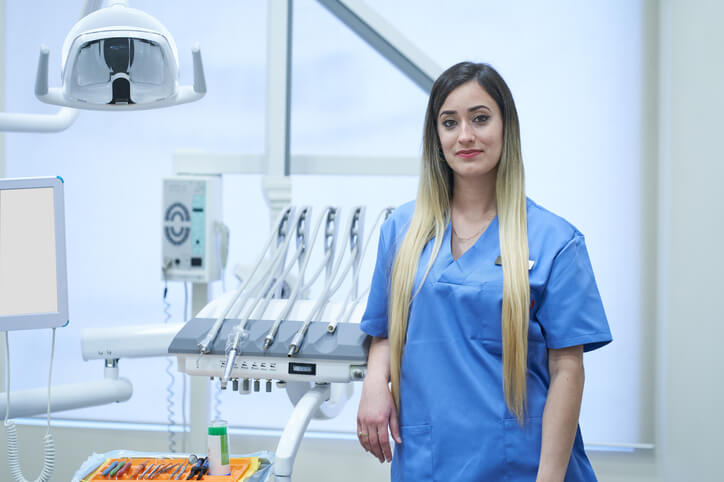Blog

3 Career Paths to Explore After Dental Hygiene Training
Dental hygienists are essential in helping clients maintain oral health and prevent dental diseases. Typically, dental hygienists work in a dental centre providing preventive dental care, such as teeth cleaning, plaque, and tartar removal, and applying fluoride treatments, among other things. Although most students go into a dental hygiene program thinking they will end up working alongside a dentist, there are many different career paths that dental hygiene graduates can take. The skills learned throughout

The Role of a Restorative Dental Hygienist
Restorative dental hygiene plays an important role in providing quality dental healthcare. It is a practice designed to provide optimal oral healthcare and correct dental issues in people of all ages. Because of this, restorative dental hygienists have become paramount professionals in dental offices, clinics, and other healthcare facilities. The work of restorative dental hygienists can bring back the smile (and confidence) to the faces of people that once suffered from dental issues. If you’re

Launch a Dental Hygienist Career in Ontario
There are so many reasons to consider becoming a dental hygienist. In addition to helping others care for their health and well-being through specialized dental skills and education, you can take advantage of plenty of opportunities for advancement and earn a competitive salary as you gain experience. If you want to enter the dental hygiene field in Ontario, you may be wondering how to launch your career. Luckily, there are just a few simple steps

Poor Dental Hygiene Can Cause Inflammation
If you’re considering a career in the dental field that allows you to help clients manage their oral health, dental hygiene is an excellent option. It’s long been understood that proper dental hygiene is directly related to a healthy smile, but according to recent research, it may have a more significant effect than most are aware of. Keep reading to learn how dental hygiene affects overall health and, more specifically, the link between oral health

Why to Wear Protective Clothing and Equipment
Dental assistants typically need to undergo intraoral dental assistant training before they qualify to work professionally. During this training and perhaps throughout their professional career, dental assistants may be regularly exposed to X-rays and other radiation, which can be detrimental to their overall health in the short or long run. Although radiation exposure in this profession is unavoidable, there are a number of measures that can be taken to reduce the risk and safeguard against

In Dental Hygienist School, You’ll Learn Diabetes is Linked to Poor Oral Health
People these days are becoming more intentional about their overall health. Curiously, though, oral health is still being relegated to the background. The truth is that neglecting oral health is detrimental to one’s overall health. The mouth functions as the portal to the whole body, and failing to care for one’s oral health will leave the body vulnerable to many health problems and chronic diseases. If you’re considering registering for dental hygienist training, the subject

Facilitate Oral Hygiene with Occlusal Adjustments
Restorative dental hygiene involves a variety of procedures to repair teeth, oftentimes fixing visual imperfections and providing patients with a confidence boost. That being said, the effects of restorative dental hygiene go far beyond cosmetics. Disease prevention will be your principal objective after dental hygienist training. Through restorative procedures and chairside patient education, you can promote improved oral health, which helps protect patients from serious ailments like heart disease and, in severe cases, sepsis. Keep

Use Comparisons to Help Boost Patient Understanding
Health literacy refers to an individual’s ability to obtain, communicate, and understand medical information. Being health literate also involves being able to describe symptoms, knowing where to go in order to deal with different health concerns, and how to manage medical treatments responsibly. As an aspiring healthcare professional, it’s essential to understand that patients’ levels of health literacy will differ, and in order to provide them with the best possible care, education should be a

Safety in Dentistry: A Guide for Students in Intra Oral Dental Assistant Training
If you want to help patients achieve healthy smiles throughout your dental assistant career, their safety and well-being are likely your main concern. Because health and safety are one of your most crucial responsibilities as an intra oral dental assistant, you may be wondering exactly what tasks you can expect to perform in order to ensure excellent care standards for your future clients. What are some of the common mistakes that intra oral dental assistants

What is the Role of a Restorative Dental Hygienist?
Are you looking for a lucrative, rewarding specialization in the field of dental hygiene? Becoming a restorative dental hygienist could be the perfect fit for you. As Canada’s population ages, the demand for these professionals are growing. In addition, many Canadians, no matter their age, are seeking to boost their confidence and enhance their appearance by improving their smiles. As an expert in this area, you can help foster every client’s positive self-image and improve
Request Free Info
Please fill out the form below to receive Information about our programs

